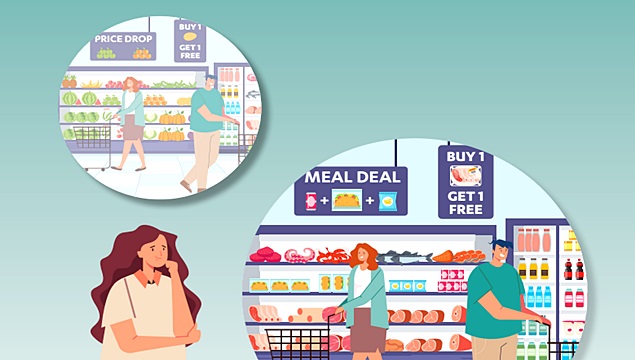1066

Who decides what you eat? A new report by BEUC - the European Office for Consumer Rights - explores what is secretly influencing consumers' diets. The way food is presented and choices framed must change to make sustainable healthy diets easy.
The new report, The Illusion of Choice - Why Someone Has Already Decided What You'll Have for Lunch, highlights how buying, preparing and eating food is largely the result of food industry decisions rather than consumer choices.
As a result, BEUC is urging policymakers to facilitate healthy, more plant-based diets with "less and better" animal products for European consumers.
This report coincides with the publication of a new 'evidence assessment' by SAPEA, a consortium of independent scientists advising the European Commission, which confirms the powerful influences on consumers' food choices.
The “food environment” conditions the choices people face – a concept that includes food marketing and advertising, promotional offers, food availability and pricing, and even the layout of stores and supermarkets.
Currently, food environments are heavily pushing consumers towards unhealthy and unsustainable foods, which are the most available, most promoted and often the cheapest options.
Reineke Hameleers, CEO of Eurogroup for Animals, noted:
"European citizens want to eat food that ensures animal welfare. However, it is often not higher welfare or plant-based foods that catch their attention from billboards or supermarket shelves, but unsustainable industrial animal products.
This must change. EU policymakers need to take action to enable consumers to switch to plant-based and healthier products."
Monique Goyens, Director General of BEUC, (European Organization of Consumers), commented:
"Why does it often cost more to buy fruit than a bag of unhealthy snacks? Healthy and sustainable food should become the common choice, not the luxury.
Supermarkets need to stop offering offers that push us towards food and drink we need to consume less of, and instead target price promotions to support healthier and greener diets. And governments must step in to ensure that all consumers can afford to buy food that is good for their health and the planet's health."
Dr. Milka Sokolović, Director General of EPHA, added:
“Our current food environments are designed to maximize nutritionally poor foods, leading to a long list of non-communicable diseases with an increasing incidence and burden on society. Policymakers bear the responsibility to reverse this situation where our food environments are making us sick. They need to support people to make healthy and sustainable food choices by making them the default option.”
Specifications
Both the report and the evaluation of the SAPEA samples were presented at the high-level event "Who decides what you eat?" hosted by Eurogroup for Animals, the European Consumer Organization (BEUC) and the European Public Health Alliance (EPHA).
This autumn, the European Commission is due to present a proposal for a legislative framework for sustainable food systems (FSFS) as one of the flagship initiatives of the Farm to Food Strategy.
This initiative has the potential to pave the way for a transformation of food environments towards ones that are healthy and sustainable by default. The Illusion of Choice report shows how important it is that this proposal is adopted by the Commission. Specifically, the healthy and sustainable food choice must be:
- The most accessible
- Widely available and attractive
- The most marketed
- Easy when eating out
- The default choice for public procurement
- And finally, food must become healthier and more sustainable by design.
About the coalition
The Eurogroup for Animals, the European Consumer Organization (BEUC) and the European Public Health Alliance (EPHA) have joined forces for a project called 'Put change on the menu' to bring the food environment debate to the fore and make campaign for food environments promoting healthy and sustainable diets with "less and better" animal products.
In its 2020 Farm-to-Food Strategy for fairer, healthier and greener food and agriculture, the European Commission announced a new EU legislative framework for a sustainable food system for 2023.
This horizontal law will introduce sustainability definitions, objectives and principles to ensure that existing and future EU food legislation consistently contributes to the goal of a sustainable food system that works within the limits of the planet.
For the Animal Eurogroup, BEUC and EPHA, it is vital that the Framework for a Sustainable Food System lays the groundwork for new concrete policy measures to address specific elements of food environments such as advertising and marketing, labelling, public procurement and accessibility of a healthy and healthy price. sustainable food.
Eurogroup for Animals represents over eighty animal welfare organizations from the EU, UK, Switzerland, Serbia, Norway and Australia. Since its establishment in 1980, the organization has succeeded in encouraging the EU to adopt higher legal standards for animal protection.
The Eurogroup for Animals reflects public opinion through its members and has both the scientific and technical expertise to provide authoritative advice on animal welfare issues. Eurogroup for Animals is a founding member of the World Federation for Animals which unites the animal protection movement globally.





